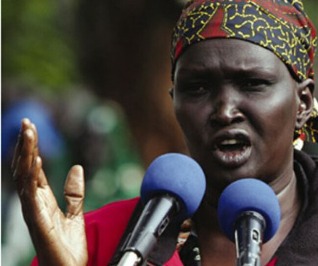S. Sudan president sacks Garang’s widow from advisory role
August 20, 2014 (JUBA) – South Sudanese president Salva Kiir Mayardit, issued a surprise decree on Wednesday sacking Rebecca Nyandeng de Mabior, the widow of the late John Garang, founding leader of the country’s ruling party (SPLM).

The presidential order was broadcast on state-owned (SSTV. The reasons behind the decision remain unknown.
However, critics of the government say the decision shows the extent of political differences that have arisen over the president’s management of the party and national affairs since Kiir took over leadership.
There was also speculation the decision was related to de Mabior’s close alliance with former vice-president Riek Machar’s rebel faction, although she later distanced herself after conflict broke out in mid-December last year.
De Mabior was among a number of senior SPLM members, including Machar, current vice-president James Wani Igga and former secretary-general Pagan Amum Okiech, who indicated their interest in contesting Kiir for the position of party chairperson.
While Igga later retracted his decision, saying he wouldn’t run for chairperson if Kiir remained interested in the same position, the other three officials said they would go ahead.
The agenda for discussion at a general convention for the political bureau, the highest executive organ in the organisational structure of the party, was subject to lengthy delays.
Several attempts were made to hold the meeting without success, generating suspicion and confusion among members of the leadership council.
In November 2013, one month before the political dispute within the SPLM turned violent, president Kiir ruled that the term of all elective structures of the ruling party had expired with the exception of his office due to the failure to hold the May 2013 national convention.
De Mabior was among a group of disgruntled senior members of the leadership council who held a press conference on 6 December 2013 challenging the president’s decision and warning against taking unilateral actions without consultation.
Igga subsequently responded with a press conference of his own on 8 December, describing the former officials as prophets of doom.
In earlier comments at an ordinary convention in October 2013, Kiir made reference to a 1991 split, saying he would not allow a similar incident to occur while he was president.
Violence erupted on 15 December in the capital, Juba, among forces of the presidential guard, before spreading to other regions throughout the country.
De Mabior said at the time that Kiir’s refusal to allow internal reform in the country’s ruling party and his subsequent decision to sack Machar and disarm Nuer soldiers from his presidential guards, triggered the conflict.
Mama Nation, as many refer to her, was also among a group of 11 disenchanted senior SPLM members aligned with Machar.
De Mabior, who hails from the Dinka Bor of Twic East county, served as
the minister of roads and transports in the Southern Sudan government prior to becoming a presidential advisor.
She left South Sudan in January and now lives in self-imposed exiled in Kenya, where she hosts a number of TV segments critical of Kiir’s governance.
The fighting in South Sudan has pitted government troops loyal to Kiir against pro-Machar rebels, reigniting tribal tensions across the country.
Thousands have been killed as a result of the conflict, while over a million people have been displaced, many of whom have fled to neighbouring countries.
Ongoing peace talks in the Ethiopian capital, Addis Ababa, have so far failed to yield a lasting political settlement to the crisis despite mounting international pressure.
(ST)
